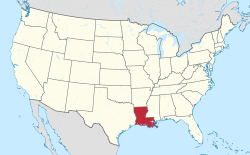Opelousas, Louisiana
| |
|---|---|
| City of Opelousas Ville des Opélousas (French) | |
 Old Federal Courthouse in Opelousas, listed on the National Register of Historic Places | |
| Motto: "Omnia ad Dei Gloriam – All Things to the Glory of God." | |
 Location of Opelousas in St. Landry Parish, Louisiana. | |
 Location of Louisiana in the United States | |
| Coordinates: 30°31′41″N 92°05′04″W / 30.52806°N 92.08444°W | |
| Country | United States |
| State | Louisiana |
| Parish | St. Landry |
| Incorporated | 1821 |
| Named for | Opelousas people |
| Government | |
| • Mayor | Julius Alsandor (Democrat) |
| Area | |
• Total | 9.68 sq mi (25.06 km2) |
| • Land | 9.67 sq mi (25.05 km2) |
| • Water | 0.00 sq mi (0.01 km2) |
| Elevation | 69 ft (21 m) |
| Population (2020) | |
• Total | 15,786 |
| • Density | 1,632.13/sq mi (630.18/km2) |
| Time zone | UTC−6 (CST) |
| • Summer (DST) | UTC−5 (CDT) |
| ZIP code | 70570 |
| Area code | 337 |
| FIPS code | 22-58045 |
| Website | http://www.cityofopelousas.com |
Opelousas (French: Les Opélousas; Spanish: Los Opeluzás) is a small city and the parish seat of St. Landry Parish, Louisiana, United States.[2] Interstate 49 and U.S. Route 190 were constructed with a junction here. According to the 2020 census, Opelousas has a population of 15,786, a 6.53 percent decline since the 2010 census, which had recorded a population of 16,634. Opelousas is the principal city for the Opelousas-Eunice Micropolitan Statistical Area, which had an estimated population of 80,808 in 2020. Opelousas is also the fourth largest city in the Lafayette-Acadiana Combined Statistical Area, which has a population of 537,947.
Historically an area of settlement by French and Spanish Creoles, Creoles of color, and Acadians, Opelousas is the center of zydeco music. It celebrates its heritage at the Creoles of Color Heritage Folklife Center, one of the destinations on the new Louisiana African-American Heritage Trail. It is also the location of the Evangeline Downs Racetrack and Casino.
The city calls itself "the spice capital of the world", with production and sale of seasonings such as Tony Chachere's products,[3] Targil Seasonings,[4] Savoie's cajun meats and products,[5] and LouAna Cooking Oil.
During the tenure of Sheriff Cat Doucet, from 1936 to 1940 and again from 1952 to 1968, the section of Opelousas along Highway 190 was a haven of gambling and prostitution, the profits from which he skimmed a take.[6]
- ^ "2020 U.S. Gazetteer Files". United States Census Bureau. Retrieved March 20, 2022.
- ^ "Find a County". National Association of Counties. Archived from the original on May 31, 2011. Retrieved June 7, 2011.
- ^ "cajunspice.com". Archived from the original on May 11, 2008. Retrieved May 8, 2009.
- ^ "targil.com". targil.com. Archived from the original on July 22, 2013. Retrieved September 11, 2013.
- ^ "savoiefoods.com". Savoiesfoods.com. Archived from the original on September 1, 2013. Retrieved September 11, 2013.
- ^ Cite error: The named reference
nelsonwas invoked but never defined (see the help page).